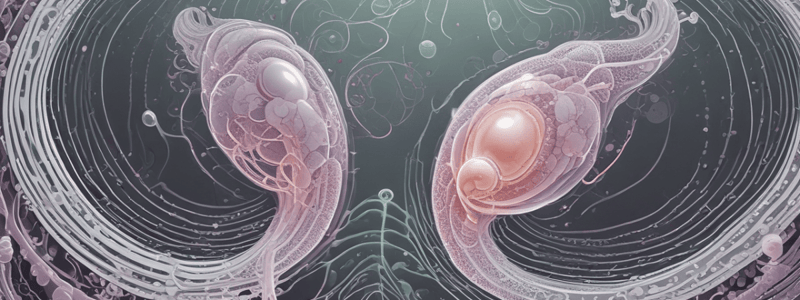Podcast
Questions and Answers
What is the process by which immature cells in the testes develop into mature spermatozoa?
What is the process by which immature cells in the testes develop into mature spermatozoa?
- Oogenesis
- Meiosis
- Mitosis
- Spermatogenesis (correct)
What is the result of meiosis I in spermatogenesis?
What is the result of meiosis I in spermatogenesis?
- Two diploid secondary spermatocytes
- Two haploid primary spermatocytes
- Two haploid secondary spermatocytes (correct)
- Four diploid primary spermatocytes
What is the function of follicle-stimulating hormone (FSH) in spermatogenesis?
What is the function of follicle-stimulating hormone (FSH) in spermatogenesis?
- Stimulation of spermatogonia to undergo mitosis (correct)
- Regulation of testosterone production
- Inhibition of meiosis
- Regulation of spermiation
What is the final stage of spermatogenesis?
What is the final stage of spermatogenesis?
What is the result of meiosis II in spermatogenesis?
What is the result of meiosis II in spermatogenesis?
What is the importance of spermatogenesis in humans?
What is the importance of spermatogenesis in humans?
What is the structure that develops during spermiogenesis?
What is the structure that develops during spermiogenesis?
Flashcards are hidden until you start studying
Study Notes
Overview
Spermatogenesis is the process by which immature cells in the testes develop into mature spermatozoa.
Stages of Spermatogenesis
- Spermatocytogenesis: Immature diploid cells called spermatogonia undergo mitosis to produce primary spermatocytes.
- Meiosis I: Primary spermatocytes undergo meiosis I, resulting in two haploid secondary spermatocytes.
- Meiosis II: Secondary spermatocytes undergo meiosis II, resulting in four haploid spermatids.
- Spermiogenesis: Spermatids mature into spermatozoa through a series of complex changes, including:
- Development of the acrosome
- Formation of the flagellum
- Condensation of chromatin
- Reduction of cytoplasm
- Spermiation: Mature spermatozoa are released from the testes into the epididymis.
Hormonal Regulation
Spermatogenesis is regulated by the hypothalamic-pituitary-testicular axis, involving:
- Follicle-stimulating hormone (FSH)
- Luteinizing hormone (LH)
- Testosterone
Importance of Spermatogenesis
Spermatogenesis is essential for male fertility, as it produces mature spermatozoa capable of fertilizing an ovum.
Stages of Spermatogenesis
- Spermatocytogenesis: Immature diploid cells called spermatogonia undergo mitosis to produce primary spermatocytes.
- Meiosis I: Primary spermatocytes undergo meiosis I, resulting in two haploid secondary spermatocytes.
- Meiosis II: Secondary spermatocytes undergo meiosis II, resulting in four haploid spermatids.
- Spermiogenesis: Spermatids mature into spermatozoa through development of the acrosome, formation of the flagellum, condensation of chromatin, and reduction of cytoplasm.
- Spermiation: Mature spermatozoa are released from the testes into the epididymis.
Hormonal Regulation
- Spermatogenesis is regulated by the hypothalamic-pituitary-testicular axis, involving follicle-stimulating hormone (FSH), luteinizing hormone (LH), and testosterone.
Importance of Spermatogenesis
- Spermatogenesis is essential for male fertility, as it produces mature spermatozoa capable of fertilizing an ovum.
Studying That Suits You
Use AI to generate personalized quizzes and flashcards to suit your learning preferences.




